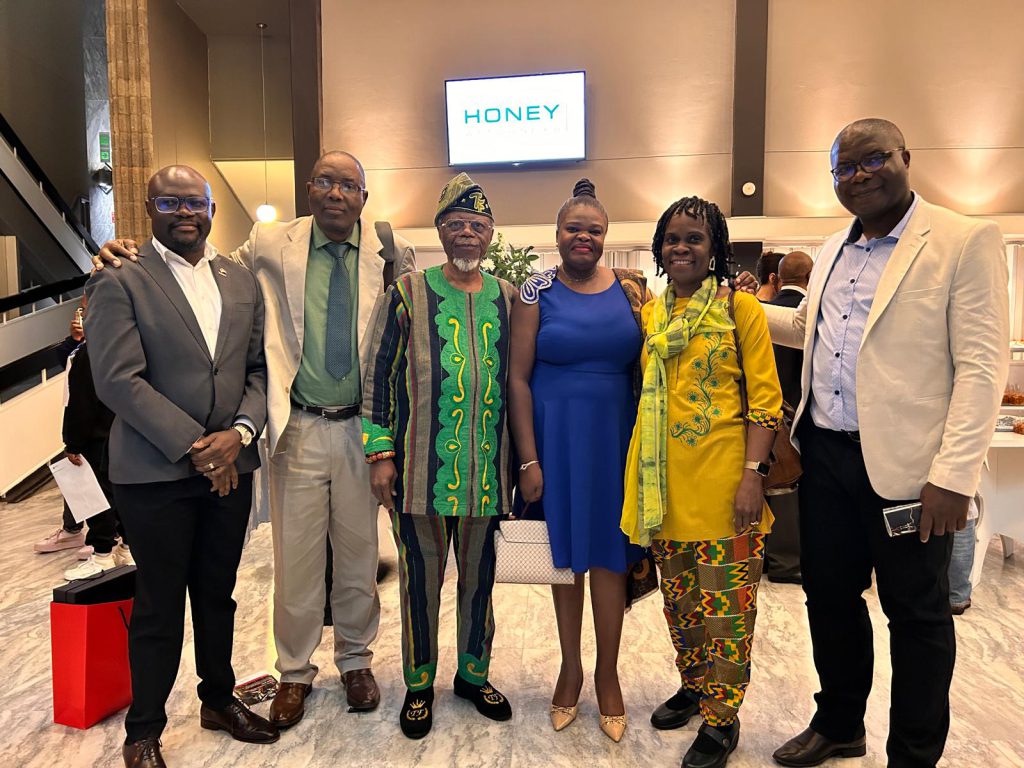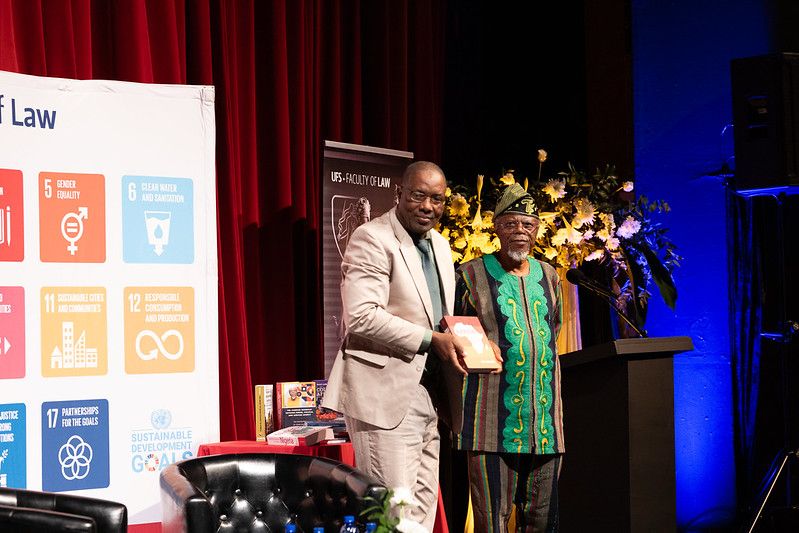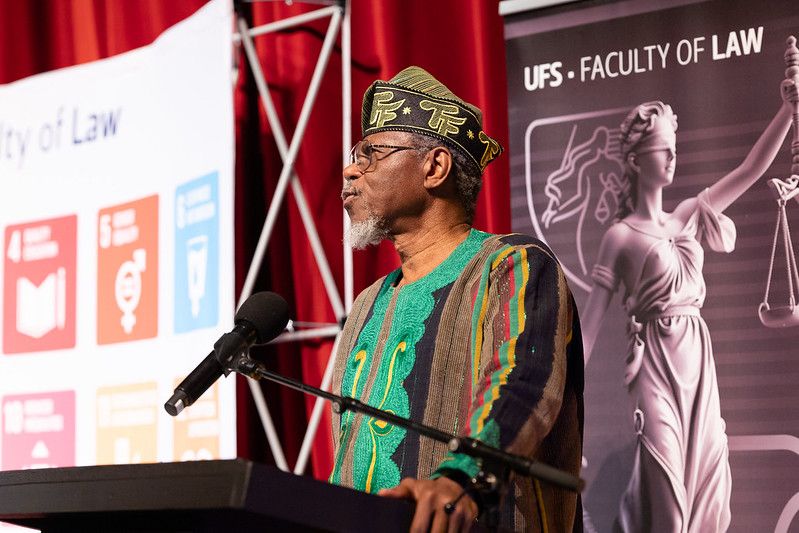By Toyin Falola
It is a privilege to have been asked by the University of the Free State to give a Keynote Address on Thursday, April 10, 2025. This major event was part of the Faculty of Law Recognition of Achievement Ceremony, preceding the Convocation ceremony.
Our first conceptual analysis of the rule of Law’ is driven by A.V. Dicey’s principle, which postulated that the rule of law inferred supremacy of the law, equality before the law and independence of the judiciary. However, in real geopolitics, we understand that the rule of law is broader than the definition prescribed by Dicey. Universally, Dicey’s principles remain persuasive, but the concept is diverse according to continent, governmental style, and constitutional expectations. In a utopian world, we should not face adversity and challenges with the rule of law as it should be all-encompassing; the dictates of the rule of law in Antarctica should be the same in Australia and all over the globe. Part of living and being sane means also coping with realities—one of such realities being that the level of adherence to the rule of law would not be the same in all regions.
Democracy and democratization are heavily linked and intertwined with the principle of the rule of law, as it was the intendment of the pioneers that there be a system of sustenance, a framework that would peddle democracy and see to its ultimate globalization. The idea of submitting the powers in the state to an individual chosen from the ballot intrigued political scholars into prophesying that it was a dangerous move to leave this individual unchecked. His discretionary powers in time could harbinger arbitrariness and unbridled weaponization of the organs of government for self-gain. Proverbially speaking, ‘Absolute power corrupts absolutely’- this was exactly what the first responders to democracy muttered in their minds.

We have been guilty of a particular charge – the ideology that the rule of law only carries the force of democracy. In this, we have failed to hold responsible nations that are not subscribed to democracy but have violated principles of the rule of law. This is a crystallized conviction for the redundancy of the rule of law both domestically and internationally. Since we have applied ourselves to the philosophy that democracy and the rule of law are Siamese twins, we, therefore, have created excuses for other systems of government to be complicit in its observation of the rule of law. The tenets of the rule of law are not just a principle of democracy but a principle of government; in all, government at every level and of any form has acquiesced to this principle.
We find ourselves guilty of yet another charge – the notion that the rule of law only applies domestically and if there is such thing as an international rule of law. The common man’s understanding of the rule of law connotes that the law, which is in force and binding, is supreme and has the structural and legal ability to coerce all those subject to its sway. In simple terms, when there is a law, there is a rule of law. At the multinational level, there are conventions, treaties and norms that individual states have held as binding on all member states who have assented to it- an example is the 1948 Universal Declaration on Human Rights and The African Charter on Human and People’s Rights. Some nations have taken not just participatory steps but have also incorporated and domesticated these international treaties. Following the idea above, since there is an international law, then there is an international rule of law- we have seen examples of the flagrant disregard for the rule of law, not just domestically but also in international relations.
Without much chatter, the United States is a very recent culprit in the trample of the rule of law internationally. While they have kept an almost clean record at home, their international archive of activities suggests a somewhat different narrative. Notably, the nascent second term of Donald Trump has promulgated executive orders which trump the rule of law- no pun intended. This executive overreach by Donald Trump has put the very fabric of the rule of law to the test, both internationally and locally. The promulgation of these executive orders has threatened to dissipate years of precedent and constitutionally guaranteed rights of Americans- a case in point is the ‘Protecting the Meaning and Value of American Citizenship’. During the Obama administration, news broke out of a heavily pregnant woman who was on her way to the United States for her maternal leave. By medical omission, there had been a miscalculation of the date of expected childbirth; in effect, she should have been on that plane two weeks earlier. Her water broke whilst on the aircraft; luckily, one of the air hostesses was a certified midwife, and she was assisted in delivering her baby girl. It was pretty intriguing that at the time she was delivered of this baby girl, the plane was journeying through American airspace. The plight of this woman was that since she was put to bed on American airspace, her child was born on American soil and was automatically a citizen. Well, Trump’s latest executive order is set to jettison this privilege and create a condition that either the father or the mother of the child at the time of birth must either be U.S citizens or permanent residents of the U.S, being born on American soil is not enough criteria to grant citizenship.

Donald Trump has also temporarily suspended aid to small countries pending a window period which would allow for a review, an analysis of whether such programs align with the foreign policies of the U.S. One particular country has gotten the attention of Donald Trump, and he made a statement to cut funding to such a country. The Republic of South Africa, in an attempt to eliminate the vestige of the apartheid system still echoing through the land ownership system in the country, opted to embark on a land expropriation scheme. A scheme that would ensure that the land ownership is evenly distributed amongst all South African citizens- the ownership system currently indicates that white South Africans, who are less than one-tenth of the population, own almost three-quarters of the lands. Trump feels that such an appropriation system is established to target the white residents in the country systematically. I see no reason why a country should not move forward from an oppressive system. The administration has taken the initiative to create a free and equitable system for all citizens. Still, Donald Trump seems bent on impugning their sovereign autonomy by threatening to strangle foreign financial assistance. It is an affront to the rule of law to hold a foreign country hostage and infringe on its ability to govern its citizenry effectively, all because it benefits from a foreign assistance package. It is widely speculated that foreign assistance from the U.S. might resume, but it is sure to come conditionally; there would be a quid pro quo- nations in need of foreign aid would implement specific favourable policies to the U.S. in exchange for the assistance.
China has overtly buffeted the principles of the rule of law; we have very veritable intrinsic evidence of how the fundamental rights of its citizens are abrogated, the press and internet are censored to monitor dissent and the sudden disappearance and relatively biased sentencing of some journalists. The fear of the government is deposited deep within the chambers of the hearts of the citizenry that even while away from home soil, they fear that the government, in retaliation to their dissent, might punish them by proxy, incarcerating and mistreating their loved ones and family members resident at home. One particular issue that caused a global reaction was the incarceration of Canadians by Chinese authorities. The Canadians have been long critics of the mannerisms of the Chinese government, and they have been very vocal in their disapproval of the Chinese government. The Canadian government arrested Chinese conglomerate Meng Zhou in connection to some financial fraud; the Chinese finally saw an action to predicate their retaliation against the Canadians. They went ahead to arrest and prosecute several Canadians residing in China; they abrogated their rights and left some in detention for up to 200 days without access to counsel or their families. This was not a retaliation to the arrest of Meng Zhou; rather, it was relatively directed at the protracted criticism made by the Canadian government.
It is inconceivable to think that the response to the criticisms of a nation calling you out on your disregard for the rule of law was to incarcerate its citizens and strangle the rule of law even more. The guilt of maintaining the position that the rule of law is a democratic principle is what has excused the Republic of China seriatim since they are not a democratic state. They are not adherent to the rule of law. The amendment to the 1999 People’s Republic of China seems to say otherwise- the amendment exchanged some certain semantical expressions in the preamble to insert the words ‘rule of law’.
This foreign disregard for the rule of law has created a bad example for the continent of Africa; as a continent, we are still in the infant years of the entrenchment of the rule of law, and we look to the paradigms set by the forerunners on the international scene. This model is reminiscent of disregard rather than regard for the rule of law. We have inadvertently incorporated this into our system, and it has affected even international relations between our states. These states once formed a coalition and a continental desire to liberate the region of Africa from the fetters of colonialism. The tensions between Rwanda and DR Congo and the military coup experienced in Niger, Gabon, Burkina Faso, Chad, Guinea and Mali are all indications of the breakdown of the rule of law. These military incursions and interventions would have been avoidable had the systems in place upheld the rule of law and the sanctity of the state. Had this been the case, there really might have been no military intervention.
While we concede that there has been a breakdown of the rule of law in Africa, there have been instances where the rule of law has taken precedence; nations like Nigeria and Liberia have transitioned to another dispensation of democracy, which ultimately testifies to the fact that the sanctity of the state is intact through the machinery of the rule of law.
The suggestion here is that we can have an independent structure for the entrenchment of the rule of law, one that is insulated from external pressure and paradigm. These frontrunners have not been exemplary; Africa as a region can be a global paradigm for the entrenchment of the rule of law. Issues like independence of the judiciary and collective cohesion to international principles and norms serve to start the skeletal structure for an independent system of the rule of law.


